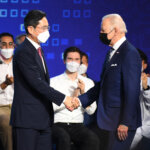TSMC: US is ‘doomed to fail’ in rebuilding its chip manufacturing sector

Over the last two years, the US government has been pulling out all the stops to boost its domestic semiconductor manufacturing. From injecting billions of dollars into the beleaguered sector to flexing all its policy muscles available to give it a leg up over competition from Asia, President Joe Biden pledged: “America is going to lead the way in microchip manufacturing.”
The world’s biggest chipmaker, Taiwan Semiconductor Manufacturing Company, or TSMC, however, has a different perspective entirely. The Taiwanese giant is actually pessimistic about efforts by the US to build domestic capacity. It was made apparent when the US House Speaker, Nancy Pelosi, visited Taiwan in August, a move that was seen as a demonstration of support against Chinese military threats.
In a meeting between Pelosi, Morris Chang, founder of TSMC, and Mark Liu, chair of the world’s largest contract chipmaker, Chang explained in stark terms that “Washington’s efforts to rebuild chip manufacturing at home were doomed to fail,” according to the Financial Times. The statement ironically comes at a time when TSMC finds itself at the center of a tug of war between Washington and Beijing, both of which are important trading partners for Taiwan.
In general though, TSMC has declined to comment on its role in geopolitics. The chipmaking giant has actively maneuvered in the narrow space between American and Chinese interests. At this point, TSMC is building new production facilities in Japan and in Arizona, while also expanding the capacity of its factory in the eastern Chinese city of Nanjing.
The vast majority of its most advanced production, however, still happens in Taiwan, where TSMC continues to build its leading-edge production facilities, called fabs. TSMC even highlighted that the sweeping controls announced by the US earlier this month, to block exports of some chip manufacturing equipment and restrict sales of certain semiconductors to China, has limited impact on its business for now.
As a matter of fact, experts are widely discussing how the politicization, instrumentalization and weaponization of technology and trade issues by the US will not stop China’s development, but instead is likely to backfire. In a report by Fitch Ratings, analysts foresaw the US government’s new restrictions on China’s access to America’s semiconductor technology leading to greater volatility towards American companies.
“US companies more reliant on sales in China are likely to see greater volatility in their earnings in the near-to-medium term, while some advanced memory solution providers could face less technological competition over the long term,” the report noted. Fitch also expects the new rules to adversely affect revenue generation at the leading chipmaking equipment producers, such ASML Holding, KLA Corporation and Lam Research, which have benefited significantly from the spending spurred by China’s plan to develop its semiconductor sector.
YOU MIGHT LIKE

Samsung’s five-year plan to lure US chip buyers
For context, sales in China made up about 13%-31% of some leading equipment producers’ revenue in the latest reporting period. “However, a proportion of this may not be affected by the sanctions, as foreign companies based in China may be able to obtain a temporary exemption license from the US government, allowing them to continue receiving products and services from US suppliers,” the report stated.
Fitch also expects the leading US electronic design automation companies, such as Cadence Design Systems, to face revenue headwinds as exports to China constitute an important strategic customer, given the industry’s reliance on Cadence for advanced chip design. Over the weekend, it was also reported that TSMC has suspended production of advanced silicon for Chinese startup Biren Technology, to ensure compliance with US regulations.
“While TSMC has not reached a conclusion on whether Biren’s products meet the US threshold for restrictions, the Taiwanese chipmaker has decided to stop supplies to the Chinese startup for now,” a source told Bloomberg. Just before that, Biren, one of China’s most promising semiconductor designers, concluded that its AI chips produced by TSMC are not covered by the latest US export restrictions because the specs of its products don’t meet the criteria that would see them curbed.









